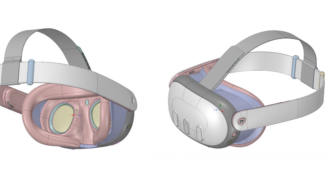Quest 3 will be priced around $300-$500 but isn’t launching this year.
In an interview with Stratechery, Meta CEO Mark Zuckerberg said “it’s not this year, but there will be a Quest 3 and that’s in the price range of $300, $400, or $500, that zone”.
Zuckerberg first confirmed Quest 3 was in development in an interview last year. He went on to say “One of the things I’m really excited about for future versions is getting eye tracking and face tracking in” – key features of Quest Pro. In February, he told Lex Fridman Meta will prioritize eye & face tracking even over making headsets as thin and light as possible.
But two weeks ago apparent schematics of Quest 3 were leaked to YouTuber SadlyItsBradley (Brad Lynch), and the headset depicted doesn’t have either eye or face tracking. It does, however, have a slimmer design achieved with pancake lenses, and a depth sensor for mixed reality. It’s possible though that Meta has multiple prototype candidates for Quest 3, and the headset seen in that leak is just one of them.

Quest 3’s biggest apparent improvement isn’t something you’d see in schematics though. Current mainstream standalone headsets – including Quest 2 and Pico 4 – use the first XR2, which was recently retroactively labeled Gen 1 by Qualcomm. XR2 Gen 1 is a variant of the Snapdragon 865 smartphone chip that first shipped in early 2020. But Qualcomm has since followed up the 865 line with two new generations, 888 and 8 Gen 1 (the company changed the naming scheme with the release of the latest model).
Meta & Qualcomm recently announced a multi-year partnership to build next-generation Snapdragon XR chipsets, and a source of Lynch told him Quest 3 will use the yet-to-be-announced Snapdragon XR2 Gen 2.
Recent import logs indicate XR2 Gen 2 is based on Snapdragon 8 Gen 2, expected to be announced at the Snapdragon Summit next month. If the new chipset’s GPU offers even a modest performance leap over 8 Gen 1, Quest 3’s GPU will be at least twice as powerful as Quest 2’s. This would enable higher fidelity graphics on higher resolution displays – and perhaps even entirely new games that simply wouldn’t be possible on Quest 2.
To be clear though: these import logs are indicative of early test chips being sent to headset makers, not mass production. Meta announced Quest 2 and Quest Pro at its yearly Connect conference, which takes place around October. If Quest 3 is coming next year, Connect is where it would likely be announced.





